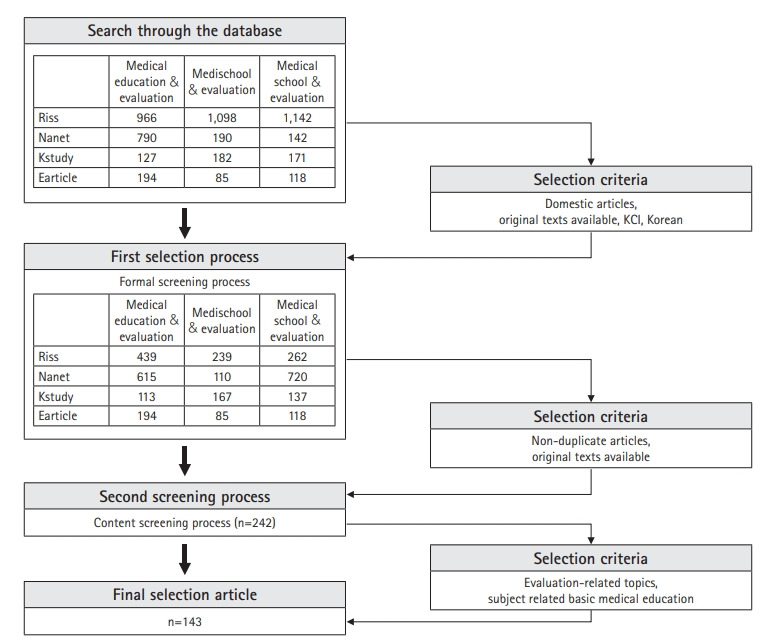Evaluation research in Korean medical education: a systematic review.
IF 1
Q3 MEDICINE, GENERAL & INTERNAL
引用次数: 0
Abstract
The purpose of this study aims to analyze research trends related to ‘evaluation’ in Korean medical education through a systematic review. This study used a systematic review method, which is a research methodology for research trends and ‘literature analysis.’ Researchers searched the Korean journal literature published until the end of December 2020 in the Korean research database with keywords related to medicine and evaluation. Thus, 5,205 cases were identified. Based on these data, 143 papers were selected through a logical screening process, requiring 1 month to complete the data search and analysis process. In terms of publications, medical journals overwhelmingly outnumbered nonmedical journals until 2015; however, after 2016, the number of papers published in nonmedical journals increased, and the number of published papers was similar to that of medical journals. In terms of evaluation-related research, research on student and program evaluations has been very active compared to that on accreditation. As the number of evaluation studies has gradually decreased over the past 10 years, preparing a plan to revitalize them in Korean medical education is necessary. Considering that the role of evaluation in education has been emphasized in recent years, research on reestablishing the concept of evaluation; developing evaluation indicators; analyzing the status of student evaluation, program evaluation, and accreditation; and deriving measures to improve medical education through evaluation is required.

韩国医学教育评价研究:系统回顾。
本研究旨在透过系统回顾,分析韩国医学教育中有关“评估”的研究趋势。本研究采用了系统回顾法,即研究趋势和“文献分析”的研究方法。研究人员以“医学”和“评价”为关键词,在韩国研究数据库中检索了截止到2020年12月末发表的韩国期刊文献。因此,确定了5205例病例。根据这些数据,通过逻辑筛选过程筛选出143篇论文,耗时1个月完成数据检索和分析过程。在出版物方面,直到2015年,医学期刊的数量远远超过非医学期刊;但2016年以后,在非医学期刊上发表的论文数量有所增加,发表的论文数量与医学期刊相近。在与评价相关的研究方面,与认证相关的研究相比,对学生和项目评价的研究一直非常活跃。在过去的10年里,评价研究的数量逐渐减少,因此有必要制定在韩国医学教育中恢复评价研究的计划。鉴于近年来评价在教育中的作用受到重视,重新确立评价概念的研究;制定评价指标;分析学生评价、项目评价和认证的现状;提出了通过评价提高医学教育质量的措施。
本文章由计算机程序翻译,如有差异,请以英文原文为准。
求助全文
约1分钟内获得全文
求助全文

 求助内容:
求助内容: 应助结果提醒方式:
应助结果提醒方式:


